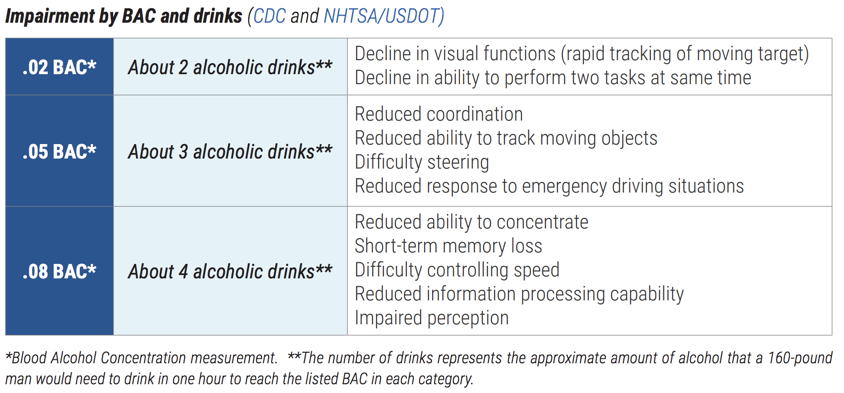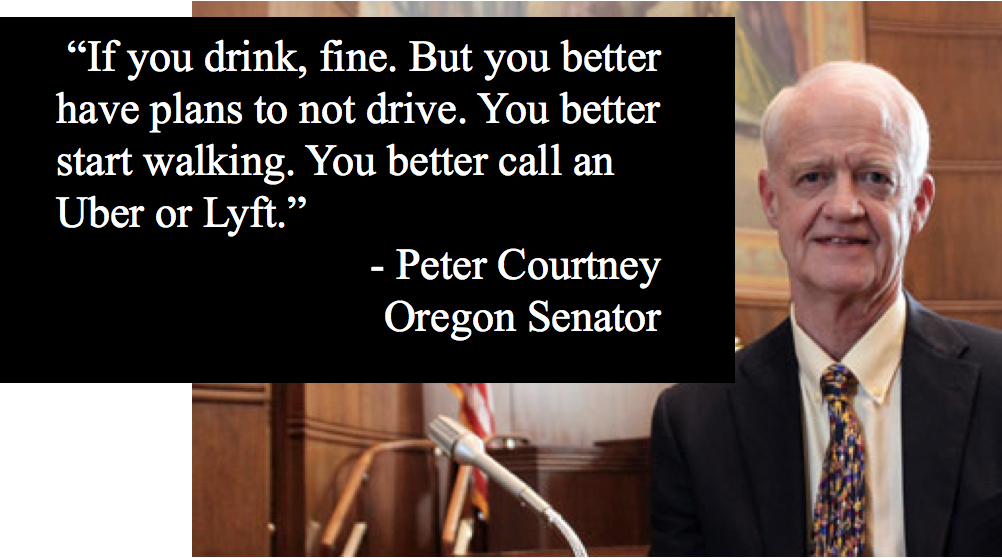In 1983, Utah was the first state to lower the level of blood alcohol content that would qualify for a DUI arrest when they went from .10 to .08. Then Oregon followed suit.
Now we’re poised to follow Utah again as the second state to reduce the DUI limit even further to .05.
That’s the intention of a bill (PDF) that’s been introduced by Oregon Senate President Peter Courtney, which is still in draft form until the legislative session formally begins next month.
A one-pager (PDF) released by Sen. Courtney’s office, says Senate Bill 7 follows a 2013 recommendation by the National Transportation Safety Board (NTSB) that all states adopt .05. The NTSB reports lowering BAC limits from .10 to .08 led to a 10.4% reduction in alcohol-related fatalities between 1982 and 2014. They also estimate a lowering to .05 would save 1,790 lives a year.
Advertisement

Below are the selling points of this legislation as per Sen. Courtney’s one-pager that’s making the rounds to safe streets advocates and Oregon Department of Transportation (ODOT) staff (note, they were drafted before Utah passed their law):
• BAC limits have been changed before, and fairly recently. Oregon and Utah were the first states to move from a 0.10 to 0.08 in 1983, Delaware was the last state to adopt 0.08 in 2014.
• Many countries have enacted a .05 BAC limit, including Australia, most of the EU, Hong Kong, Israel, and South Africa.
• A 160-pound man would have to drink 4 alcoholic drinks an hour to reach a BAC of 0.08, verses 3/hour to reach 0.05.
• Drivers with a BAC of 0.05-0.79 are 7 times more likely to be in a fatal crash than drivers with no alcohol in their system.*
• According to the NTSB, lowering BAC limits from .10 to .08 reduced annual alcohol related fatalities by 10.4% nationwide. NTSB estimates a reduction from .08 to .05 would result in an 11.1% decline in fatal crashes.*
• Decreasing BAC limits does not reduce average alcohol consumption.*
In a phone interview with Sen. Courtney this morning, he said the growing distractions inside cars and the prevalence of alcoholism in his family influenced his thinking on the issue. “I’ve had alcoholism on both sides of my family, I fear it more than any other drug,” he said. “I don’t need any studies on this. I grew up with it. There’s this attitude you can drink and drive. You have no damn business behind the wheel if you’ve been drinking. I don’t want to hear it. If you drink, fine. But you better have plans to not drive. You better start walking. You better call an Uber or Lyft.”
The bill as currently written would make one simple amendment to ORS 813.010, changing every instance of “.08” to “.05”. Utah just passed a similar law that goes into effect December 30th.
Lowering Oregon’s BAC level has been a goal of ODOT for years. It’s currently listed as a “Tier 1” priority in the state’s Transportation Safety Action Plan (PDF). That plan reports impaired driving (alcohol and/or drugs) was a factor in 22 percent of all fatal and serious injury crashes in Oregon between 2009 and 2013. That equates to 625 fatalities and 1,087 serious injuries.
And yes, in Oregon bicycle riders can be arrested for DUI.
Lisa Taylor, an assistant legislative director in Sen. Courtney’s office, says they’re seeking public feedback on the bill. She can be reached at (503) 986-1604 or at lisa.taylor@oregonlegislature.gov.
Another place for feedback and debate about this bill will be the Governor’s Advisory Committee on DUII, whose mission is to, “… Generate public support for increased enforcement of state and local drunk-driving laws. Educate the public as to the dangers of driving while under the influence and its effects on life and property.” Their next meeting is on January 4th in Salem.
Sen. Courtney downplays the chances of the bill. “I’m a laughingstock for this. I doubt it will get a public hearing.” He said he expects major blowback from the restaurant and alcohol lobbyists. “That industry is going to fight this, because that’s how they make a living.”
— Jonathan Maus: (503) 706-8804, @jonathan_maus on Twitter and jonathan@bikeportland.org
Never miss a story. Sign-up for the daily BP Headlines email.
BikePortland needs your support.


